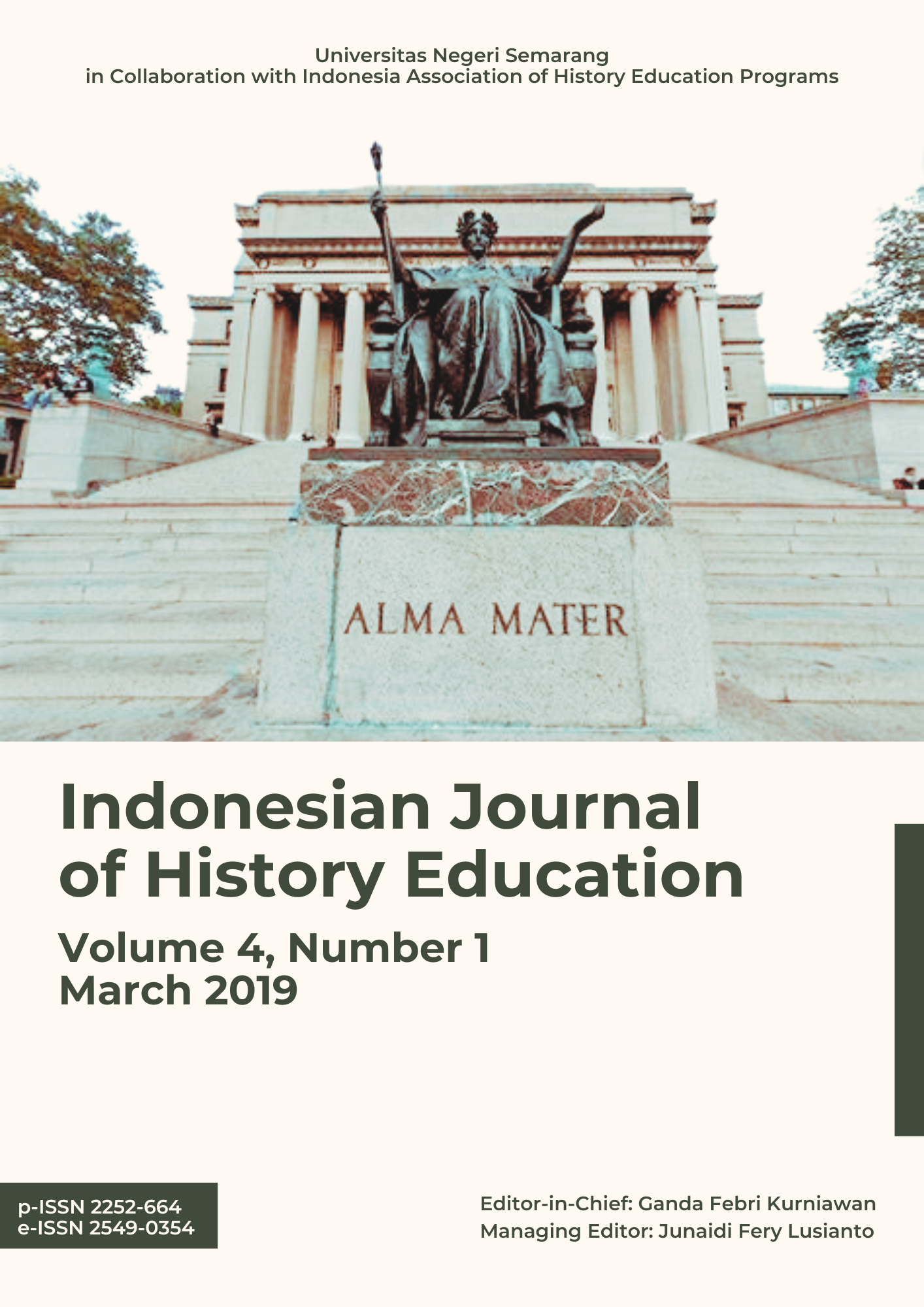Influence Utilization Assignment-Based Project About the History of the Old City To Motivation Studying History for Class XI SMA Negeri 3 Semarang
Abstract
History learning has a vital role in developing students' knowledge. However, it often faces challenges such as a lack of interest, which can make students feel bored, and often repeated material. This research uses a quantitative approach with an experimental design to identify students' learning motivation in history subjects in class XI SMA Negeri 3 Semarang, both in groups that receive project-based learning and those that do not. The research results showed that the average pre-test score for the experimental class was 114.125, and for the control class was 110.125. Analysis of the coefficient of determination shows that around 24% of the variation in learning motivation can be explained using project-based learning. In contrast, the remainder, 76%, is influenced by other factors not examined in this study. These findings confirm that project-based learning significantly impacts students' learning motivation in the context of history learning in high schools and can provide valuable insights for developing more effective and engaging learning strategies in the future.
References
Ahmad, T. A., Sodiq, I., & Suryadi, A. (2014). Kendala-Kendala Guru dalam Pembelajaran Sejarah Kontroversial di SMA Negeri Kota Semarang. Paramita: Historical Studies Journal, 24(2).
Aman. (2011). Model evaluasi pembelajaran sejarah. Penerbit Ombak.
Amar, S., & Rahmawati, B. F. (2017). Evaluasi Pembelajaran Sejarah. Staffnew UNY.
Daryanto. (2010). Media Pembelajaran. Gava Media.
Ermayanti, A. (2017). Persepsi Peserta Didik Terhadap Pembelajaran Sejarah Di SMA Negeri 1 Gondang Nganjuk. Skripsi. Universitas Nusantara PGRI: Kediri.
Firdianti, A., & Pd, M. (2018). Implementasi manajemen berbasis sekolah dalam meningkatkan prestasi belajar siswa. Gre Publishing.
Hidayah, E. N. (2015). Penerapan metode pembelajaran berbasis proyek dengan penilaian produk untuk meningkatkan kreativitas dan hasil belajar sejarah peserta didik kelas X MIA 4 SMA negeri 1 Gambiran tahun ajaran 2014/2015.
Isjoni. (2007). Pembelajaran Sejarah dalam Satuan Pendidikan. Alfabeta.
Kusmayadi, Y. (2017). Hubungan Antara Pemahaman Sejarah Nasional Indonesia dan Wawasan Kebangsaan Dengan Karakter Mahasiswa (Studi Pada Mahasiswa Pendidikan Sejarah FKIP Universitas Galuh Ciamis). Agastya: Jurnal Sejarah Dan Pembelajarannya, 7(2), 1-19.
Kusuma, Z. L., & Subkhan, S. (2015). Pengaruh Motivasi Belajar dan Kedisiplinan Belajar terhadap Prestasi Belajar Mata Pelajaran Akuntansi Siswa Kelas XI IPS SMA N 3 Pati Tahun Pelajaran 2013/2014. Economic Education Analysis Journal, 4(1).
Mahmudah, M. (2018). Pengelolaan kelas: Upaya mengukur keberhasilan proses pembelajaran. Jurnal Kependidikan, 6(1), 53-70.
Matitaputty, J. K. (2016). Model pembelajaran isu-isu kontroversial dalam pembelajaran sejarah. Jurnal Social Science Education, 3(2), 185-192.
Nasikah, Z. (2016). Pengaruh Kebiasaan Membaca Sejarah Islam Dan Motivasi Belajar Terhadap Hasil Belajar Sejarah Kebudayaan Islam Siswa di Madrasah Tsanawiyah Al-Huda Bandung.
Rifa’i, A., & Anni, C. T. (2012). Psikologi pendidikan. Semarang: Pusat Pengembangan MKU/MKDK-LP3 Unnes.
Sardiman, A. M. (2012). Pembelajaran sejarah dan nilai-nilai kepahlawanan. Paper Pendidikan Sejarah Fakultas Ilmu Sosial Universitas Negeri Yogyakarta, 1-8.
Sardiman. (2007). Interaksi dan Motivasi Belajar Mengajar. PT Raja Grafindo Persada.
Slameto. (2010). Belajar dan Faktor-faktor yang mempengaruhinya. Rineka Cipta.
Sodikin, A., & Utomo, C. B. (2018). Efektifitas Penerapan Model Pembelajaran Berbasis Proyek Melalui Projeck Display History Terhadap Hasil Belajar Sejarah Siswa Kelas XII SMAN 1 Pulokulon. Historia Pedagogia, 7(2), 138-146.
Subagyo. (2010). Membangun Kesadaran Sejarah. Widya Karya Semarang.
Sugiyono. (2009). Metode Penelitian Kuantitatif Kualitatif dan R&D. Alfabeta.
Sunarti, S. (2013). Hubungan penerapan metode ceramah, diskusi dan penugasan dengan hasil pembelajaran mata pelajaran IPS/Sejarah bagi peserta didik. Jurnal Ilmiah Pendidikan Sejarah IKIP Veteran Semarang, 1(1).
Theresia, S. (2013). Peningkatan Kualitas Pembelajaran Sejarah Melalui Pembelajaran Kooperatif Teknik Jigsaw Pada Siswa Kelas X SMA Warga Surakarta. Jurnal Penelitian, 16(2).
Wahab, A. (2013). Dualisme Pendidikan Di Indonesia. Lentera Pendidikan: Jurnal Ilmu Tarbiyah dan Keguruan, 16(2), 220-229.
Widja, I. G. (1989). Dasar-dasar pengembangan strategi serta metode pengajaran sejarah. Jakarta: Depdikbud.
Winarti, M. (2017). Mengembangkan nilai nasionalisme, patriotisme, dan toleransi melalui enrichment dalam pembelajaran sejarah tentang peranan Yogyakarta selama revolusi kemerdekaan. Historia: Jurnal Pendidik Dan Peneliti Sejarah, 1(1), 13-22.
Copyright Notice
An author who publishes in the Jurnal Indonesian Journal of History Education agrees to the following terms:
- Author retains the copyright and grants the journal the right of first publication of the work simultaneously licensed under the Creative Commons Attribution-ShareAlike 4.0 License that allows others to share the work with an acknowledgement of the work's authorship and initial publication in this journal
- Author is able to enter into separate, additional contractual arrangements for the non-exclusive distribution of the journal's published version of the work (e.g., post it to an institutional repository or publish it in a book) with the acknowledgement of its initial publication in this journal.
- Author is permitted and encouraged to post his/her work online (e.g., in institutional repositories or on their website) prior to and during the submission process, as it can lead to productive exchanges, as well as earlier and greater citation of the published work (See The Effect of Open Access).
Read more about the Creative Commons Attribution-ShareAlike 4.0 Licence here: https://creativecommons.org/licenses/by-sa/4.0/.




